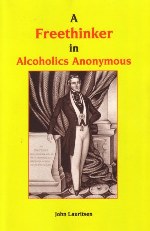Fifty Chosen Articles:
Number Seven.
Posted on AA Agnostica in October 2012.
Quotes from Bill Wilson:
“How much and how often did we fail?”
“Let us never fear needed change. Once a need becomes clearly apparent… in AA as a whole… we cannot afford to sit still and look the other way.”
By Roger C.
Bill W spoke at the General Service Conference held in New York City in April, 1965. The Conference theme was “Responsibility To Those We Serve.”
AA was thirty years old. Bill was 70 years old. It was a period of reflection for him. “We old-timers are a vanishing breed,” he said of the early members of AA. “The greater part of us have gone out into the sunset of this world.”
He expressed the hope that the disappearing early AAers had left the members of the day a heritage sufficient to their needs, one which could be “enlarged and enriched.”
Bill was preparing for the 30th Anniversary International Convention to be held later that year in July in Toronto. Much of the spirit of the Conference would also prevail at the Convention, where the theme would be, simply, “Responsibility,” and Bill would repeat much of this speech.
Bill looked back over the years; he did a bit of an inventory of AA’s history, “the better to reveal the areas in which we can improve ourselves.”
“Without much doubt, a million alcoholics have approached AA during the last thirty years,” he said. Estimating that “350,000 of us are now recovered from our malady” through the fellowship of AA, he continued, “So we can very soberly ask ourselves what became of the 600,000 who did not stay.”
No doubt some alcoholics “cannot be reached because they are not hurt enough, others because they are hurt too much. Many sufferers have mental and emotional complications that seem to foreclose their chances,” Bill acknowledged.
But what about all the others?
“How much and how often did we fail them?” he asked.
“Our very first concern should be with those sufferers that we are still unable to reach.”
He had some sense of the failings of the fellowship he had helped launch and which he still clearly revered. One of the themes for his talk was one he had broached before: a growing rigidity in AA.
He referred directly to a contingent within the fellowship which, often unwittingly, made it difficult for an increasingly large number of people to feel comfortable in the rooms of AA. “It is a historical fact,” he said, “that practically all groupings of men and women tend to become dogmatic. Their beliefs and practices harden and sometimes freeze. This is a natural and almost inevitable process.”
He discussed some of the ways that this rigidity could harm the fellowship.
“In no circumstances should we feel that Alcoholics Anonymous is the know-all and do-all of alcoholism,” Bill said, referring to the work of other organizations in the United States and Canada engaged in research, alcohol education and rehabilitation.
“Research has already come up with significant and helpful findings. And research will do far more.”
“Those engaged in education are carrying the message that alcoholism is an illness, that something can be done about it.”
Bill then talked about the growth of rehabilitation facilities in North America and the number of alcoholics treated by these agencies. “True, their approach is often different from our own,” he said.
“But what does that matter,” he asked, “when the greater part of them are or could be entirely willing to cooperate with AA?”
“Too often, I believe, we have deprecated and even derided these projects of our friends.”
“So we should very seriously ask ourselves how many alcoholics have gone on drinking simply because we have failed to cooperate in good spirit with all these other agencies whether they be good, bad or indifferent. Assuredly no alcoholic should go mad or die simply because he did not come straight to AA in the first place.”
Bill was of the view that hardened or frozen beliefs and practices were dangerous in AA. “Simply because we have convictions that work very well for us, it becomes quite easy to assume that we have all of the truth.”
“Whenever this brand of arrogance develops,” he warned, “we are sure to become aggressive. We demand agreement with us. We play God.”
“This isn’t good dogma. This is very bad dogma. It could be especially destructive for us of AA to indulge in this sort of thing.”
Bill defended the right of all AAers to have their own beliefs and to be able to freely express them.
“All people must necessarily rally to the call of their own particular convictions and we of AA are no exception.” Moreover, he continued, “all people should have the right to voice their convictions.”
Bill then returned to the subject of those who had come into AA but not stayed. “Newcomers are approaching us at the rate of tens of thousands yearly. They represent almost every belief and attitude imaginable.”
“We have atheists and agnostics,” he said. “We have people of nearly every race, culture and religion.”
And then Bill got to the heart of his message of responsibility.
In AA we are supposed to be bound together in the kinship of a universal suffering. Therefore the full liberty to practice any creed or principle or therapy should be a first consideration. Hence let us not pressure anyone with individual or even collective views. Let us instead accord to each other the respect that is due to every human being as he tries to make his way towards the light. Let us always try to be inclusive rather than exclusive. Let us remember that each alcoholic among us is a member of AA, so long as he or she so declares.
Towards the end of his address, Bill commented on how difficult it has been for AA to grow at important moments in its history. “Our fears and reluctances and rebellions have been extreme each time we have been faced with great turning points in this society,” he said.
“Let us never fear needed change,” he concluded. “Once a need becomes clearly apparent in an individual, a Group, or in AA as a whole, it has long since been found out that we cannot afford to sit still and look the other way.”
Much of this address – with only minor changes – is reproduced in an article by Bill that was published in July 1965 in the AA Grapevine, Responsibility Is Our Theme. As already noted, the theme of AA’s 30th Anniversary International Convention held later that year was “Responsibility.” It was in response to the concerns raised by Bill that those present adopted the Responsibility Declaration. In an extraordinarily moving event after Bill’s speech on July 3, 1965 at Maple Leaf Gardens in downtown Toronto, more than 10,000 delegates, trustees and AA representatives from 21 countries rose to their feet, joined hands and, led by Bill, recited the new AA declaration with one voice: “I am responsible. When anyone, anywhere, reaches out for help, I want the hand of AA always to be there. And for that I am responsible.” Inspired by this unconditioned affirmation of inclusion, agnostic AA groups invariably end their meetings with this declaration.
For a PDF of this article, click here: Responsibility is Our Theme.
The post Responsibility is our Theme first appeared on AA Agnostica.






